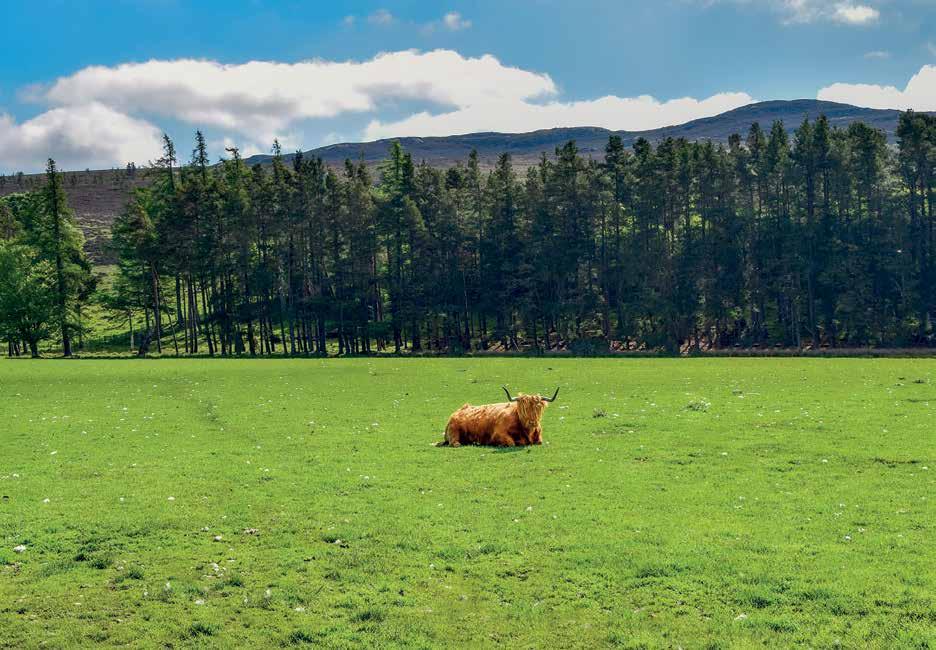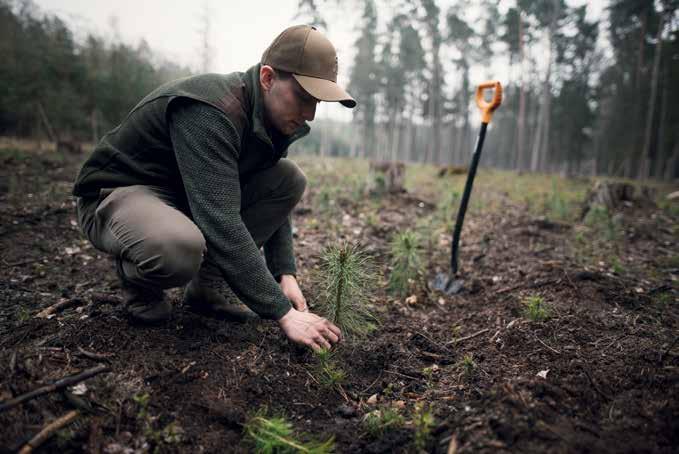
9 minute read
Forestry a force for good in creating jobs for a net zero workforce
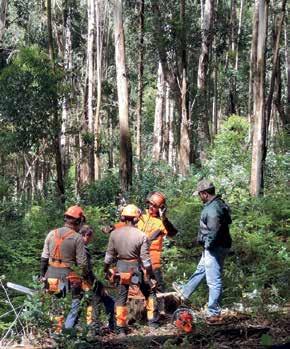
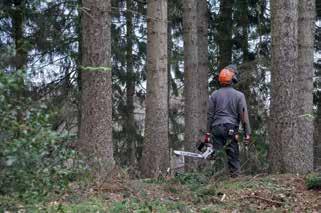
Anew report published by the CCC in May estimated that “afforestation could see up to 40,000 new jobs” being created in the UK.
‘A Net Zero Workforce’ highlights areas of the economy which could potentially have a significant impact on the UK’s efforts to meet its Net Zero targets by 2050 (2045 in Scotland). Forestry and horticulture are among those identified as delivering economic growth and employment.
Crucially, the report noted that the “development of afforestation could create opportunities across the UK, including in areas with historically low employment levels”.
The CCC concluded that “with the right conditions, Net Zero can provide an opportunity for growth in high-quality jobs, distributing opportunities across regions and increasing diversity”. However, the report also stated that “without active management (of the transition), there are risks of an inadequate UK skills base to deliver the transition and inequitable or disruptive impacts for the workforce and communities”.
It advised that to unlock the greatest jobs and economic growth benefit, governments should identify key sectors and work with them to develop and maintain the momentum towards achieving net zero, while also seeking to support new employment that will benefit those sectors and geographies most impacted by the shift to a lowcarbon economy.
Forestry and agriculture
The parallel issues of opportunity and challenge can be seen in land-use and agriculture, one of the key sectors that the CCC looked at. The report identified that tree planting/forestry will grow, as will nonlivestock agriculture, but that livestock agriculture will contract.
Reflecting the language that the Scottish Government has used on a just transition, the report said that “the transition provides a range of opportunities, from driving growth in areas with historically low employment to diversifying the workforce of core Net Zero sectors”, but it also comes with risks that will need to be managed, including “an inadequate supply of skilled workers, and potentially disruptive impacts to some communities”. continued on p13
Achieving the levels of tree-planting ambition in the CCC’s Balanced Pathway could require between 6,600 and 39,000 new workers by 2030 in the UK (peatland restoration could produce up to 560 and 2,200 additional jobs), according to the CCC.
‘A Net Zero Workforce’ acknowledged that some of this work could be undertaken by people already employed in the agriculture sector (e.g. by incentivising farmers to diversify) and that barriers exist to finding new workers to enable the forestry sector to grow.
An increase in land used for carbon sequestration, and a shift in UK diets to less meat and dairy as set out in the CCC’s Sixth Carbon Budget, would result in a change to the way land is managed. The literature examined by the CCC suggests that 7,000 to 42,000 jobs could be lost from farming as a result.
Near Drumnadrochit, Inverness-shire
132.57 Hectares / 327.58 Acres
For Sale
Offers over £1,100,000
Young forest investment opportunity with a high yielding timber crop along with 16,526 registered woodland carbon PIU’s in an outstanding location with excellent access and sporting rights included.
Boon Wood
Near Lauder, Scottish Borders
38.98 Hectares / 96.32 Acres
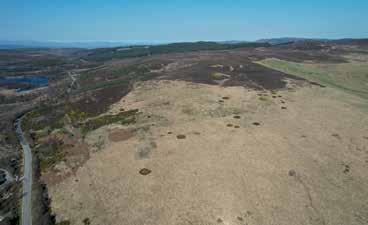
For Sale
Offers over £890,000
A mature Sitka spruce plantation with a substantial volume of timber ready to be felled in an excellent location for timber sales with fertile soils suitable for growing high yield class crops.
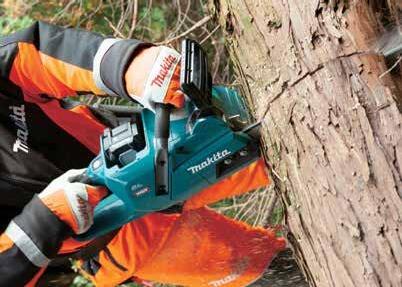
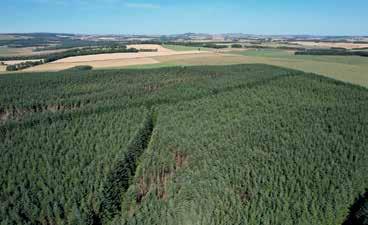
To see details of these properties and others currentlyforsale, please visit: www.landfor.co.uk
Selling Agent: Patrick Porteous +44 (0)7444 559510 patrick@landfor.co.uk • www.landfor.co.uk
Regional Harvesting & Marketing Manager
DUMFRIES - SOUTH WEST SCOTLAND
We are seeking an EXPERIENCED, ENTHUSIASTIC AND SELF-MOTIVATED INDIVIDUAL WITH RELEVANT HARVESTING AND MARKETING EXPERIENCE to join our existing team in South-West Scotland. Based out of our Dumfries office, key duties will involve working closely with our existing clients, customers, markets and involved in the development of new business.
Applicants should have ...
an in-depth and extensive understanding of timber harvesting marketing; standing sale assessments; site planning; harvesting systems and as head of the department, you should have proven experience of leading and developing an existing timber harvesting management team & contractors across a wide geographical location.
Demonstrable operational experience is required, and Forestry qualifications are advantageous but not a pre-requisite. You will have excellent professional acumen, be commercially aware, be IT literate and possess excellent communication and organisation skills. Demonstrable experience of working with contractors, project management and health & safety management are also essential for the role.
Candidates must also have a current driving licence to perform the remit of the role.
Scottish Woodlands offer ...
Scottish Woodlands offer an attractive salary and benefits package. This includes company vehicle, generous pension scheme, life assurance, permanent health insurance, private health care and the opportunity for equity participation.



Closing Date 16th June 2023 www.tilhill.com www.scottishwoodlands.co.uk
Scan the QR code to find out more and apply...
Broughtonknowe Wood
Broughton | Scottish Borders | 55.85 Hectares / 138.01 Acres
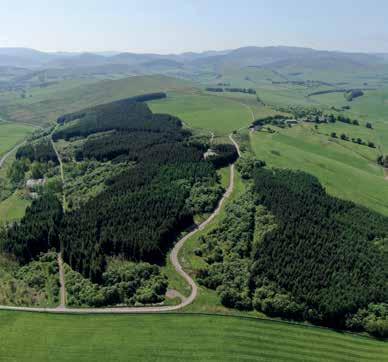
Possibly the most charming and interesting mixed woodland in the Scottish Borders.
FREEHOLD FOR SALE IN 3 LOTS OR AS A WHOLE
Lot 1: Broughtonknowe Wood - 45.79 Hectares / 113.15 Acres
Offers Over £715,000
Lot 2: Broughtonknowe North - 9.13 Hectares / 22.56 Acres
Offers Over £130,000
Lot 3: Buildings - 0.93 Hectares / 2.30 Acres
Offers Over £30,000
AS A WHOLE: Offers over £875,000
For further details, please contact:
Jon Lambert MRICS jon@goldcrestlfg.com - 07900 320 475
Emily Watson emily@goldcrestlfg.com - 07919 315 813
18 Great Stuart Street, Edinburgh, EH3 7TN +44 (0) 131 3786 122 | of�ice@goldcrestlfg.com | www.goldcrestlfg.com continued from p10
Bringing these two sectors together, the report noted that livestock farming activity could be redirected to activities like tree planting and management on farms (i.e. on-farm diversification), and that lost farming jobs could be replaced by new jobs in forestry, while noting that the median age of a farm-holder in the UK is 60.
Interestingly, the report also examined the impact of job creation in “enabling sectors” that will support the transition to Net Zero. These include educators and skills providers as well as finance through bol- stering green finance – an area where the UK government wants the country to be a leader.
Managing the transition
The report makes clear that governments can make a difference, to help enable a ‘just transition’. The key actions include:
• Identifying key sectors e.g. agriculture, land-use and forestry.
• Bringing the sectors together to plan for the transition.
• Offering government funding for reskilling, accessible career advice and the availability of alternative employment.
While governments need not intervene in every sector of the economy, the report strongly recommended that government “should develop clear plans that identify when and where policy responses are needed”. Policy must be put in place if it is to harness the potential of the transition and manage its risks.
Confor has welcomed the report, stating that it is keen to work with governments and farming representatives in a strategic, considered way and called on governments to bring the parties together to maximise the opportunities for creating jobs in areas undergoing transition.
Setting out priorities for future afforestation in Scotland
A recent Scottish Forestry consultation sought views on the Forestry Grant Scheme, looking for ways to improve the funding across a number of goals. Confor’s National Manager for Scotland, April Armstrong, summarises the response submitted on behalf of our Members.
Following a process of significant engagement and discussion with Members across Scotland, Confor last month submitted a 20-page response to the Scottish Forestry consultation on the existing Forestry Grant Scheme (FGS).
Views were being sought on how the FGS may be invigorated and better integrated with other sources of funding, strengthening Net Zero, biodiversity, economic and community wealth building priorities.
Additionally, the consultation was used as a vehicle to gather insights on the development of grant support for forestry post-2025, namely through the Agricultural Bill when it replaces the current legislative framework provided by the Scotland Rural Development Programme.
The questions fell under five headings:
1. Introduction and rationale for providing grant support for forestry
2. Forests delivering for Scotland’s Climate Change Plan
3. Integrating woodlands on farms and crofts
4. Forests delivering for people and communities
5. Forests delivering for biodiversity and the environment
Our response set out a scenario for Scotland’s forestry industry that reflected the priorities of our Members, reiterating that priority should be given to ensuring a smoother delivery of the current scheme rather than introducing additional requirements/constraints.
The need for grant support
We believe the FGS should remain a discreet offering within the future Scottish Agricultural Bill, and that it should remain under Scottish Forestry’s remit, albeit with the inclusion of annual recurrent maintenance payments. These are currently claimed through the Single Application Form (SAF) – a system that was not designed with forestry in mind.
Whilst requiring a discrete offering to ensure that the FGS reaches its highest potential, we would also like to see greater synergy with agricultural funding, integrating policy that allows farmers and other landowners to easily access forestry funding. Changes to specific areas under the existing grants framework would allow for better complementarity between the forestry and agriculture funding options, especially for smaller woodland creation applications.
Adjustments for inflation
Grant rates have remained stagnant for almost four years with the last review taking place in June 2019. Given recent inflation, which has seen deer fencing costs exceed double of that provided by FGS, these rates are no longer allowing our Members to “overcome” the high capital costs associated with the creation of new woodlands.
An increase in grant rates is essential if we are to see planting targets achieved. We also highlighted the potential of elevated grant rates coupled with a lower administrative burden to incentivise smaller schemes and requested increased rates for more challenging woodland creation schemes, boosted support for woodland management, and the removal of fixed grant models in support of more diverse forestry.
The consultation additionally proposed a grant support mechanism that has more flexibility to maximise opportunities to blend private and public finance to support woodland creation. We agreed with this premise, recognising that this could facilitate greater levels of tree planting and help achieve government targets. However, we are cautious that it is planned appropriately and in conjunction with industry to avoid any unintended consequences.
Tackling climate change
Confor and our Members understand the importance of forestry’s role in tackling the climate emergency and achieving net zero with forests, and in particular productive forests, sequestering large amounts of carbon.
Our forests must be resilient to changes in climate to ensure the future of our industry, however we do not feel continued on p14 continued from p13 it should be the role of the FGS to regulate compliance against baseline levels of environmental and climatic benefit. Instead, we see the FGS as the driver to forest establishment and would like to see greater support with woodland creation.
Requirements for resilience against the impacts of climate change and pests and diseases should, in our view, remain within the remit of UKFS. However, we have noted concern about the fixation on percentage of a single species at a given site denoting ‘resilience’, and instead believe in the righttree-right-place approach as the percentage model fails to approach the issue at a landscape scale.
Confor stands ready to work with Scottish Government to establish and undertake the research that would inform resilience.
Forests for communities
The forest-based industry wishes to play an increasingly important role in supporting economically vibrant rural communities and areas. Woodland creation schemes are already seeking to support Community Wealth Building (CWB) and would welcome grant support to enable this to happen more consistently.
We would also like to see an improved Public Register to ensure that there is greater transparency about proposals and the decisions that have been made on them. This is an issue that has long required attention and could reduce the time and administrative burdens of routine enquiries, whilst also providing stakeholders with all the initial information they require.
Support for biodiversity
Our Members have emphasised that one of the key issues in addressing biodiversity loss is the management of herbivore impact, particularly issues caused by deer. Grant support must provide a greater degree of flexibility for landowners and managers to tackle the impact of deer based upon the site and landscape conditions that an application resides in.
As such, Confor would like to see grant provision for deer management that allows wider management options and sits within the standard grant offering.
We also identified regeneration and native woodland creation incentives, woodland creation grant aid for the repair of existing damaged woodland, and funded research into the biodiversity benefits of forests and woodland that are managed productively as areas requiring attention.
Applicant frustrations
Confor took this opportunity to raise the concerns of our Members around severe time delays for application approvals. It is difficult to ignore that this is a major constraint to woodland creation and is impacting the industry’s ability to deliver and meet targets in any given year.
Applicants awaiting a decision are prevented from being able to plan resources, including the hiring and training of staff that is essential given the current skills shortage that the industry is facing.
Going forward, Confor hopes to see more support and training being delivered to Scottish Forestry staff to improve effective and timely decision making, in addition to the implementation of a defined timeline for the consideration of grant applications.
More information Links to the Scottish Forestry consultation and Confor’s full response are available on our website: https://bit.ly/43O7Xwu
